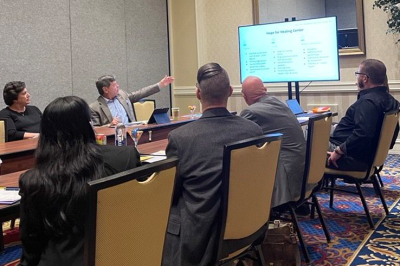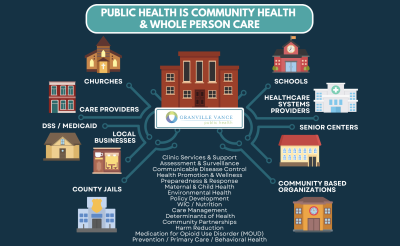Gillings alums coordinate public health efforts to confront opioid use in rural NC
August 4, 2023
By Gillings Public Health Communications Fellows Amma Agyemang-Duah and Rachel Morrow
According to the state’s Department of Health and Human Services, more than 4,000 North Carolinians died of a drug overdose in 2021 – the highest number of yearly deaths on record. The challenge of opioid use disorder (OUD) has a devastating impact on the families and communities of N.C., but a recent legal settlement will fund state and local public health efforts to address the harms of OUD.

Lisa Macon Harrison
This spring, UNC Gillings School of Global Public Health alumni Lisa Macon Harrison, MPH (’06 Public Health Leadership Program), Samantha Karon, MPH (’22 health behavior), and Nidhi Sachdeva, MPH (’07 health behavior and health education), led a meeting to explore evidence-based opioid treatment strategies with peers. Granville Vance Public Health (GVPH) hosted the meeting for members of the Opioid Solutions Leadership Network, a national cohort of 30 county leaders striving to work with communities to uncover the best ways to use opioid settlement funds to improve health and save lives.
Public health benefits from collaboration across organizations and communities with shared or related goals. It starts at the local level, but lessons learned in one community often apply in others. Sharing this knowledge improves the ability of each organization to make people healthier. Because the Gillings School emphasizes working across organizations and centering communities, it’s no surprise that Gillings alumni are part of this collaboration.
Samantha Karon, senior program manager at the National Association of Counties and a key coordinator for the meeting, says the most notable part of organizing the event was “the strength and extent of relationships between Granville Vance Public Health and its external partners. We worked with 16 speakers representing 13 organizations, but it felt like working within one unified team.”
Karon also notes that the goal of this event was to “build a platform for county leaders to share knowledge and offer support to maximize the impact of opioid settlements. From studying how Granville and Vance Counties have created a comprehensive system of care for people affected by the opioid crisis to ideating how participants can overcome barriers to services in their home jurisdictions, the peer exchange aims to build county capacity to invest settlement funds in strategies that will make the greatest possible difference.”

Participants in the Opioid Solutions Leadership Network meet in a peer exchange workshop.
Discussions, which enabled county leaders to share these strategies, focused on utilizing opioid settlement funds as a lever for change, delivering treatment and harm reduction services in rural communities and coordinating services to create a comprehensive system of care.
Panelists led a discussion of ongoing work in their communities and the impact the opioid settlement funds will have. Evidence-based harm reduction strategies were a main topic of conversation. Harm reduction strategies, such as medications for opioid use disorder (MOUD), are key to reducing stigma and getting those who are experiencing OUD the treatment they need quickly. Policies are also shifting to encourage harm reduction strategies. The Food and Drug Administration approved the over-the-counter sale of Narcan (naloxone), a drug to reverse opioid overdose, in March of this year. The Americans with Disabilities Act, passed in April 2022, included protections for people using MOUD therapy.
N.C. is one of 46 states in a $26 billion agreement that will bring funds to support communities impacted by opioids through harm reduction, treatment, recovery and other life-saving programs. Of these funds, 85% will go to communities for collaborative solutions to address the community impact of OUD. Local public health experts can help determine which evidence-based strategies work best for specific populations and how best to ensure that settlement funds have a collective impact.
GVPH has been a bright spot in local public health’s response to OUD, led by experts like Macon Harrison, GVPH’s health director and adjunct assistant professor at the Gillings School, and Medical Director Shauna Guthrie, MD, MPH, FAAFP. Guthrie co-developed the first MOUD treatment plan for primary care clinics in N.C. in 2018. This plan is now available as a “how to” guide to help other communities implement this treatment strategy in primary care.
”GVPH is proud of the work we have accomplished in response to community needs and with community partners,” said Macon Harrison. “Public health has a critical role to play in ensuring everyone has access to prevention strategies, care and treatment for the whole person.”
The Opioid Solutions Leadership Network provides opportunities for community leaders to come together and discuss how Opioid Settlement Funds can best be used. OUD and its effects will continue to be felt for years to come, but all in attendance spoke with determination and optimism for the future. Policies and laws are changing to support public health officials in their efforts to provide the best patient-centered care that they can to those with OUD.
Contact the UNC Gillings School of Global Public Health communication team at sphcomm@unc.edu.

